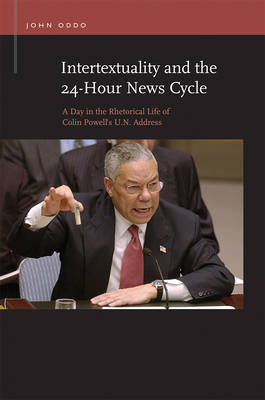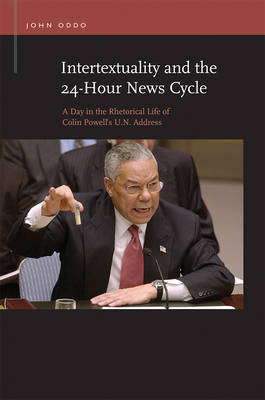
- Afhalen na 1 uur in een winkel met voorraad
- Gratis thuislevering in België vanaf € 30
- Ruim aanbod met 7 miljoen producten
- Afhalen na 1 uur in een winkel met voorraad
- Gratis thuislevering in België vanaf € 30
- Ruim aanbod met 7 miljoen producten
Zoeken
Intertextuality and the 24-Hour News Cycle
A Day in the Rhetorical Life of Colin Powell's U.N. Address
John Oddo
€ 67,95
+ 135 punten
Omschrijving
On a cold Wednesday morning in February 2003 Colin Powell argued before the United Nations Security Council that Iraq harbored weapons of mass destruction. Before the speech, nearly 90 percent of Americans reported that Powell's speech would help them determine their view about invading Iraq. In the days after the speech, a strong majority of Americans reported that they found Powell's evidence convincing enough to justify war. But most American adults did not watch Powell's speech. Instead, they learned about it from journalists--and to a large extent formed their opinions about war with Iraq based on news coverage of his address. In Intertextuality and the 24-Hour News Cycle John Oddo investigates the "rhetorical life" of Colin Powell's address as it was extended across several media reports. Focusing on one day of pre- and postspeech news coverage, Oddo examines how journalists influenced Powell's presentation-- precontextualizing and recontextualizing his speech, and prepositioning and repositioning audiences to respond to it. The book surveys a variety of news media (television, newspaper, and Internet) and systematically integrates several methodological approaches (critical, rhetorical, discourse-analytic, and multimodal). This revealing text shows the decisive role that journalists played in shaping American attitudes about Powell, his presentation, and the desirability of war in Iraq.
Specificaties
Betrokkenen
- Auteur(s):
- Uitgeverij:
Inhoud
- Aantal bladzijden:
- 350
- Taal:
- Engels
- Reeks:
Eigenschappen
- Productcode (EAN):
- 9781611861402
- Verschijningsdatum:
- 1/08/2014
- Uitvoering:
- Paperback
- Formaat:
- Trade paperback (VS)
- Afmetingen:
- 150 mm x 229 mm
- Gewicht:
- 612 g

Alleen bij Standaard Boekhandel
+ 135 punten op je klantenkaart van Standaard Boekhandel
Beoordelingen
We publiceren alleen reviews die voldoen aan de voorwaarden voor reviews. Bekijk onze voorwaarden voor reviews.











